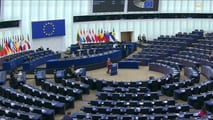ECLJ Submits Legal Analysis to the U.N. High Commissioner for Human Rights on "Defamation of Religions"
(United Nations - June 26, 2008) -- The European Centre for Law and Justice (ECLJ) submitted a legal analysis on the United Nations resolution "Combating Defamation of Religions" in response to the invitation of the U.N. Office of the High Commissioner of Human Rights (OHCHR). The legal analysis was submitted on June 24th.
The very controversial concept of "Defamation of Religions", designed by the Organization of Islamic Conference (OIC), establish as the primary focus and concern the protection of ideas and religions generally, rather than protecting the rights of individuals to practice their religion, which is the chief purpose of international religious freedom law.
An examination of the OIC conception of human rights in the areas of religious freedom and expression shows a distinct conflict with the international bill of human rights. Specifically, the implementation of domestic laws to combat defamation of religion in many OIC countries reveals a selective and arbitrary enforcement toward religious minorities, who are often Christians. Those violations are frequently punishable by the death penalty.
Associated with "anti-blasphemy laws", the OIC uses the concepts of "defamation of religions" as both sword and shield. In Islamic countries, blasphemy laws are used as a shield to protect the dominant religion, but even more dangerously, they are used to silence minority religious believers and prevent Muslims from converting to other faiths, which is still a capital crime in many Islamic countries.
In its legal analysis, the ECLJ explained why the concept of "defamation of religions" is in direct violation of international law concerning the rights to freedom of religion and expression, and how it is incompatible with the universal philosophy of human rights.
Emphasizing that a proper respect for religions is necessary, the ECLJ insisted on the urgent need to stop the arbitrary enforcement of the law and to draw a clear line between valid criticism of religions or religious practices and speech that does not serve any purpose except to offend the beliefs of individuals or religions.
In conclusion, the ECLJ called on the High Commissioner of Human Rights and the U.N. to oppose the model of "defamation of religions" and, instead, to focus on Article 20 of the International Covenant on Civil and Political Rights (ICCPR) adopted in 1966 as the proper framework to consider the issue.
The ECLJ document concludes by urging the U.N. to "develop clear guidelines within the context of Article 20 with regard to laws that would set the least restrictive limitations of freedom of speech that would help to respect and protect the religious beliefs of individuals."
You can read the ECLJ legal analysis here.
In addition to its legal analysis, the ECLJ has compiled and submitted a list of recent incidents worldwide involving the concept of defamation of religion. The ECLJ submission will be used by the High Commissioner for Human Rights to report to the U.N. Human Rights Council on the implementation of the resolution "Combating Defamation of Religions" and to submit a study compiling relevant existing legislations and jurisprudence concerning defamation of and contempt for religions to the Council at its ninth session (September 2009).
You can read the resolution here.
The European Centre for Law and Justice (ECLJ) is an international law firm dedicated to protecting human rights and religious freedom in Europe and worldwide. Attorneys for the ECLJ have served as counsel in numerous cases before the European Court of Human Rights. Additionally, the ECLJ has special Consultative Status with ECOSOC of the United Nations, and is accredited to the European Parliament.








